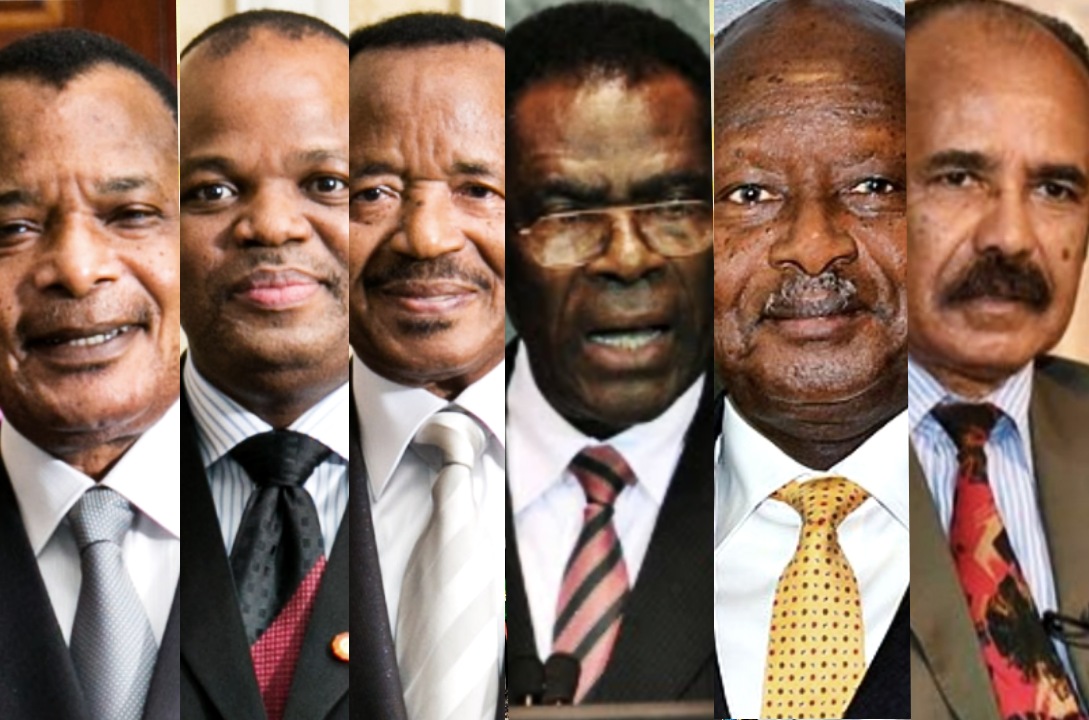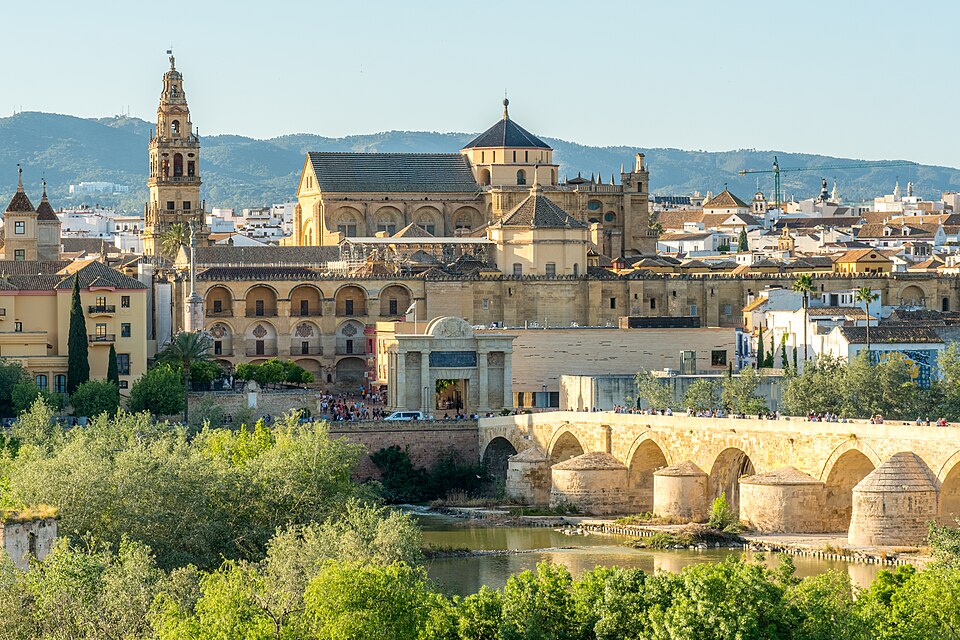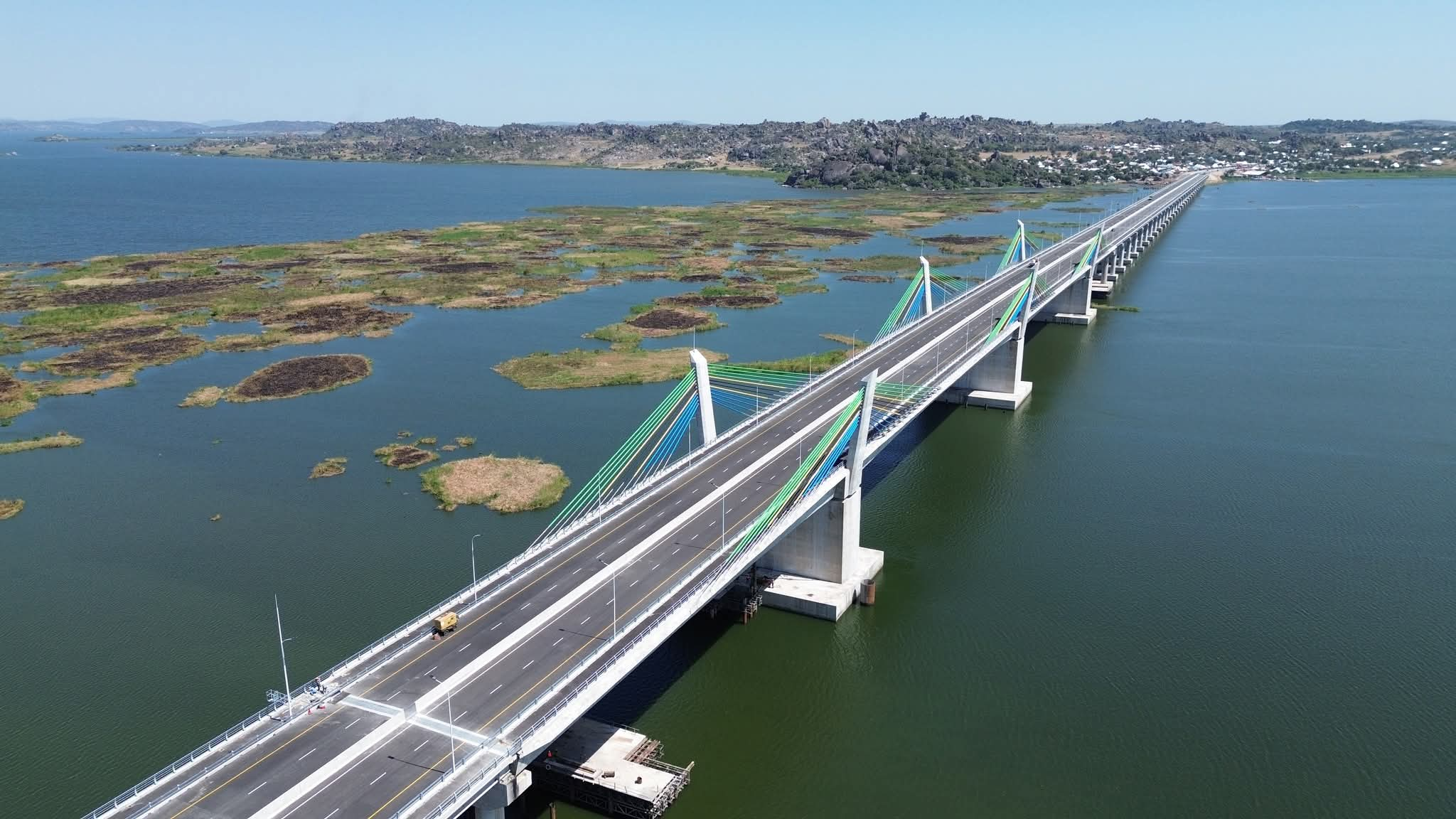POLITICS: Africa's Longest-serving Leaders in 2023

Did you know that the longest-serving president of any country ever and the second-longest consecutively-serving current non-royal national leader in the world is 81-year-old President Teodoro Obiang Nguema Mbasogo of Equatorial Guinean?
There are three ways many African leaders manage to cling on to power for decades. It is either by force, breaking laws, or bending constitutions to suit their interest. These has become an established norm that has been practiced throughout the modern history of the continent.
Here is a compilation of six of the current longest-serving African heads of state.
1] TEODORO OBIANG NGUEMA MBASOGO (44 year rule) – Equatorial Guinea
Born 5 June 1942, Teodoro Obiang Nguema Mbasogo is a former military officer who has served as the second president of Equatorial Guinea since 3 August 1979, making him the longest-serving president of any country ever and the second-longest consecutively-serving current non-royal national leader in the world. Obiang is regarded as an authoritarian leader, and has been widely accused of corruption and abuse of power. Under his rule, Equatorial Guinea continues to have one of the worst human rights records in the world. Equatorial Guinea is currently a dominant-party state, in which Obiang's PDGE holds virtually all governing power in the nation and has held all or almost all seats in the legislature since its creation. The constitution provides Obiang sweeping powers, including the right to rule by decree, effectively making his government a legal dictatorship. At the age of 80, he is seeking another sixth term lasting seven years.
2] PAUL BIYA (41 year rule) – Cameroon
Born Paul Barthélemy Biya'a bi Mvondo on 13 February 1933, Paul Biya is a Cameroonian politician who has served as the President of Cameroon since 6 November 1982, having previously been Prime Minister of Cameroon from 1975 to 1982. Biya succeeded President Ahmadou Ahidjo as President upon the latter's surprise resignation in 1982 and consolidated power in a 1983–1984 staged attempted coup in which he eliminated all of his major rivals, making him the second-longest-ruling president in Africa, the longest consecutively serving current non-royal national leader in the world and the oldest head of state in the world. He introduced political reforms within the context of a one-party system in the 1980s, later accepting the introduction of multiparty politics in the early 1990s under serious pressure. He won the contentious 1992 presidential election with 40% of the plural, single-ballot vote and was re-elected by large margins in 1997, 2004, 2011, and 2018. Opposition politicians and Western governments have alleged voting irregularities and fraud on each of these occasions. Many independent sources have provided evidence that he did not win the elections in 1992 and that subsequent elections suffered from rampant fraud.
3] DENIS SASSOU NGUESSO (39 year rule) – Congo
Born on 23 November 1943, Denis Sassou Nguesso is a Congolese politician and former military officer. He has served as president of the Republic of the Congo since 1997. He served a previous term as president from 1979 to 1992. During his first period as president, he headed the Congolese Party of Labour (PCT) for 12 years. He introduced multiparty politics in 1990, but was stripped of executive powers by the 1991 National Conference, remaining in office as a ceremonial head of state. He stood as a candidate in the 1992 presidential election but placed third. Nguesso was an opposition leader for five years before returning to power during the Second Republic of the Congo Civil War, in which his rebel forces ousted President Pascal Lissouba. Following a transitional period, he won the 2002 presidential election, which involved low opposition participation. He was re-elected in the 2009 presidential election. The introduction of a new constitution, passed by referendum in 2015 amidst calls for boycott then a dismissal of results by opposition leaders, enabled Nguesso to stand for another term. He was re-elected in the 2016 presidential election with a majority in the first round.
4] YOWERI MUSEVENI (37 year rule) – Uganda
Yoweri Kaguta Museveni, born on 15 September 1944, is a Ugandan military officer, politician and revolutionary who has been serving as the ninth president of Uganda since 1986. After he lost the election of 1980, he started the Ugandan Bush War which led to the removal of Milton Obote. Museveni's rule has been described by scholars as competitive authoritarianism, or illiberal democracy. The press has been under the authority of government. None of the Ugandan elections since 1986 have been found to be free and transparent. Museveni's presidency has been characterized by an upsurge in anti-gay legislation and activity, involvement in the First Congo War, the Rwandan Civil War, and other African Great Lakes conflicts; the Lord's Resistance Army insurgency in Northern Uganda, which caused a humanitarian emergency; and constitutional amendments, scrapping presidential term limits in 2005, and the presidential age limit in 2017. On 16 January 2021, he was re-elected for a sixth term with 58.6% of the vote, despite many videos and reports that show ballot box stuffing, over 400 polling stations with 100% voter turnout, and human rights violations. As of 2022, he has ruled for 36 years.
5] KING MSWATI III (38 year rule) – Kingdom of Eswatini
Eswatini, Africa's last remaining absolute monarchy, has been ruled by King Mswati III for 36 years. He ascended to the throne in April 1986 aged just 18, thus becoming the youngest ruling monarch in the world at that time. Mswati III, born Makhosetive on 19 April 1968, is Ngwenyama (King) of Eswatini and head of the Swazi royal family. With unrestricted political power and able to rule by decree, Mswati III (together with his mother, Ntfombi Tfwala, now Queen Mother (Ndlovukati)) is the last remaining absolute monarch in Africa and one of the only 12 remaining absolute national or subnational monarchs in the world. Under the constitution, the king is the commander-in-chief of the defence force and commissioner-in-chief of police and correctional services and Mswati III exercises ultimate authority over all branches of the national government and effectively controls local governance through his influence over traditional chiefs.
6] ISAIAS AFWERKI (30 year rule) – Eritrea
Isaias Afwerki, born on 2 February 1946, is an Eritrean politician and partisan who has been the president of Eritrea since shortly after he led the Eritrean People's Liberation Front (EPLF) to victory in 24 May 1991, ending the 30-year-old war for independence from Ethiopia. In addition to being president, Isaias has been the chairman of Eritrea's sole legal political party, the People's Front for Democracy and Justice (PFDJ). Isaias, 76, has ruled the Horn of Africa nation with an iron fist since independence in May 1993. As Eritrea has never had a functioning constitution, no elections, no legislature and no published budget, Isaias has been the sole power in the country, controlling its judiciary and military. Hence, scholars and historians have long considered him to be a dictator, described his regime as totalitarian, by way of forced conscription; the United Nations and Amnesty International cited him for human rights violations. In 2022, Reporters Without Borders ranked Eritrea, under the government of Afewerki, last out of 180 countries in its Press Freedom Index. In 2023 Eritrea ranked 174th out of 180 countries on the Press Freedom Index.
Sources: VOA | Wikipedia
#penglobalfactfile


_1755775186.jpg)
